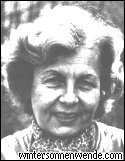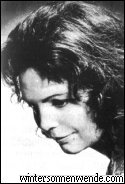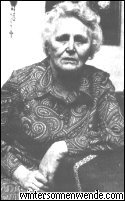  |
 Ingomar Pust
Ingomar Pust
"Cesarean Section",
Czech-Style
 ohanna Huber continues: ohanna Huber continues:
"But the most gruesome death of all was reserved for my pregnant neighbor, Frau Kosnarsch.
Her
amputee husband (he had lost a leg), both her parents, and her daughter were brutally beaten to
death in the house. The pregnant woman's stomach had been trampled or cut open; it was one
huge, gruesome, horrible, dreadful wound. The umbilical cord was wrapped around the dead
woman's throat, and the unborn baby's brains were splattered over the wall.
"On our estate lived 80-year-old Anna Preis. A partisan smashed her glasses with a club in such
a
way that the glass shards cut her eyes. The blinded woman hanged herself in despair a few days
later.
"Suicide was the only way out for many people in those days. Today we know that there was a
huge wave of German suicides throughout all of Czechoslovakia. We too searched the barn, in
vain, for some ergot with which to poison ourselves. The pharmacist Pfeifer,
a half-Jew who had been horribly abused, advised us to take razor blades and slit our wrists to
escape all the horror, he said that this was the least painful death. What luck that we couldn't
find
any razor blades. Fate spared our lives, even if we did lose everything that the hard work of
generations had wrought."
In May and June the wave of suicides that struck many towns and villages of the Sudetenland
claimed the lives of older people in particular. By law the Germans no longer had any rights
whatsoever. If they even had a home left at all, they were forced to keep it open to plunderers at
all
times. They had to hand in all their valuables, from jewelry to cameras.
Germans were forbidden to use public transit. They were forbidden to leave their homes, except
on
orders or at specific
times. Letter-writing was also forbidden, as was entering a public inn, a train station or a post
office. They usually received no ration cards at all, and if they did, these included no stamps for
meat, eggs, milk, cheese or
fruit - which meant the death sentence for many children.
Insofar as they were not already locked up in the concentration camps, the Germans were
obligated to forced labor without pay. In many places, the people were ordered to assemble at
certain locations, whence they were transported off as labor slaves to work in agriculture, mining
or industry. The German clergy was also not spared the orgy of hate. Cistercian abbot
Eberhard Harzer of Ossegg recounts:
"At every other step on my return to the cell I had to step over a dead
or half-dead person. Back in the barracks I heard the old German men
of Maria-Ratschitz being shot down behind the barracks wall. They included almost all the
old Christian-Socialist party members. The women were beaten horribly, to the point where they
could barely see through the swelling. All women had been raped, and many had severe internal
injuries and were infected with syphilis.
"When the 'Svobodici' could rape no more, they resorted to bottle necks with which they
continued torturing the women. When I left this camp in October, many of these women were
still
lying badly injured in
the sick-rooms."
The abbot had been repeatedly arrested, abused and released again.
On November 29, 1945, he writes, "I was arrested again and taken to the concentration camp in
Dux. There were
some fellow-prisoners there who had endured that terrible day in Bilin. Men and women from
the
environs of Bilin were herded together in the market square where they had to strip naked and
then had to
march single-file past the Czech population, who beat them with whips and canes. After that, the
men in particular had to crawl in a row on all fours like dogs, and were beaten until they lost
control over their bowels. The ones behind then had to lick it off the ones in front of them. This
torture continued until many had been beaten to death; the priest of Radowesitz was among
these.
What was done to the women there is simply beyond
description - the sadistic monstrosity of it all is too much."
 .
Father lay in the Pile of Corpses
.
Father lay in the Pile of Corpses he women suffered terrible things in those days. Frau Hermine
Weissmann of Klagenfurt recounts: he women suffered terrible things in those days. Frau Hermine
Weissmann of Klagenfurt recounts:

Hermine Weissmann:
"To this day the memories make me tremble."
|
"My experiences still weigh on my mind so much that I start to tremble whenever I so much as
speak about them. I was 17 years old at the
time - at that age a person retains things very vividly. I am from Southern Moravia. My home
town, Schaffa, is one kilometer away from the Austrian border. In our town there were never any
Czechs - only servants - and then the gendarmerie.
"On May 5, 1945 the Czechs came to get my father. He wasn't even given enough time to put his
shoes on. They beat
him half-unconscious and dragged him to a truck and threw him up like an
animal - we were paralyzed with horror.
"On May 13 we were taken to a forest clearing near Stallek. Even from afar we could already
smell the stench of decomposing bodies. We were forced to search through the mountain of
corpses for our missing relatives. I don't know how many dead bodies lay there, swollen and
distended by the heat. All of them
lay face-down, and all wore the identifying armband 'Nemecky'. All of them had been murdered
via a bullet in the neck. We recognized them by their
clothes - it was truly hell. We were 'generously' permitted to take our dead home, at night and in
a
box that stood ready.
"Meanwhile the other men of the town had also been apprehended, and for two days and nights
they were crowded together without food in the basement of the local school, which was
flooded chest-high with water. Then they were flogged there with whips to whose ends iron nuts
had been tied, and whoever passed out, drowned.
"Later the survivors were taken into the interior of Czechoslovakia. Many never
returned - and for those who did, it was not until 1946, and they were broken men. My uncles
Lambert Koller and Johann Mang were among them. When the Czechs went on the rampage
among those of us who remained in the town, we went for help from the Russians, who were
stationed in Riegersburg, Austria, three kilometers away.
"On June 4, 1945, Czechs with guns at the ready took my family and me to the Austrian border
and expelled us. We were allowed to take 50 pounds of luggage, and even that was ultimately
taken from us at the border."
Frau Sylvia Schlosser, Vienna:

Sylvia Schlosser
|
"We saw dreadful, inconceivable cruelties in the camp. Often we heard the screams of the
tortured
people all day and night long. We children were also beaten. I lost my father, a physician, to a
horrible fate. From my uncle, who was in a camp in Moravian Ostrau together with my father, I
learned that my father, who had had to work in the coal pits, was killed most brutally. He and
other men had to stand in front of a coal cart that
held red-hot coal, and guards poured that over the German men. The charred corpses were then
thrown into a mass grave. Our family physician from Moravian Ostrau was hanged, his mother,
more than 80 years old, was torn to pieces on a market square by tying her legs to two horses.
Many innocent people shared that same fate.
"When I remember this horrible time after the war in that country, I do also recall a Czech
woman
who risked her own life to take some food to her former employer in the Czech concentration
camp, and I recall the young Czech woman who got me out of the camp for a few weeks by
persuading the Czech camp guard that she needed someone to help her with
her six-month-old baby. I was not quite ten years old at that time. The woman gave me
something
to eat, and that was certainly not the least reason why I survived."
Frau Therese Stonner-Ther from Bad Groß-Ullersdorf:
"In June 1945 my sister, Gertrud Guntermann, was found badly wounded in her home in
Moravian Schönberg. One of her neighbors hurried to the nearest doctor and asked for
help.
The doctor brusquely refused any and all aid, and said, 'A German can bloody well die!' And so
my 42-year-old sister died without even so much as a minimum of medical attention and was
thrown into a pit outside the cemetery together with many other murdered Germans. My father
wanted to at least buy a coffin, but that was forbidden. Similarly, the new Czech owners of my
father's drugstore would not even allow my mother to pick some flowers from the garden that
had
used to be ours, to take to my poor dead sister's
grave. - I would like to add that my sister had never been politically active in any way."
 .
The Russians as Life-Savers
.
The Russians as Life-Savers rau Josefine Waimann left a large estate behind in
Czechoslovakia. The
scenes of horror that she witnessed in Masaryk Stadium in Prague are stamped indelibly on her
memory. rau Josefine Waimann left a large estate behind in
Czechoslovakia. The
scenes of horror that she witnessed in Masaryk Stadium in Prague are stamped indelibly on her
memory.

Josefine Waimann:
Masaryk Stadium was an inferno.
|
"Already in late April we fled from the Russians, to the Americans, in the direction of Pilsen,"
reports Frau Waimann, who today lives in Klagenfurt. "But the Americans handed us over to the
Russians by the thousands, and the Russians then directed our refugee columns towards
Prague.
"But the Soviets did protect us from the attacks of the Czechs. Without their escort we would
have
been beaten to death on the way, before we even reached Prague. In this respect the Russians
made short work of the Czechs. In Königswiese near Prague I saw a Czech beating a
German lieutenant. When the latter tried to defend himself, the Czech shot him. A Russian saw
that, pulled out his pistol and gunned the Czech down without a word.
"Still under Russian guard, we were herded through the raging pandemonium of Prague, in
whose
streets horribly mutilated bodies of German privates hung from the street lamp posts
everywhere,
and on into Masaryk Stadium. There, we were caught up by the Czech murder machine.
"Words fail me to describe what took place in the first few days in that stadium, where by and by
40,000 Germans were crammed together, without water, almost entirely without food. Men,
women, children and soldiers. My little children cried for hunger.
"Before our eyes there began a sadistic revenge against SS-men and
'incriminated' persons, who
were tortured to death in every way imaginable. I most vividly remember a young pregnant
woman; young Czechs in uniform slit her belly open, tore out the embryo and, howling with
glee,
stuffed a dachshund into the torn body of the woman, who was screaming horribly. We huddled
in
the grandstands. The butchering in the arena before our eyes was like that in ancient Rome.
"Constantly, groups of privates who had been discovered to be marked with
the SS-rune were liquidated in the most horrible fashion, first they were flogged, then beaten
with
clubs, and finally shot. They were only ever shot after protracted torture. The screams of the
agonized victims who were being skinned alive went right through us. And thousands of children
had to watch all this. How many of them must have been psychologically traumatized for life!
Among the doomed I saw many very young fellows, they could not yet have been 17 years old.
They must have been just drafted. Now these poor boys were caught by the merciless torture of
this murder machine. The bodies were dumped in deep trenches. Insofar as there was enough
space, many were thrown into the latrines of the enormous stadium, and we had to relieve
ourselves over the
bodies - but it was only water and mucus anyhow.
"Added to the horrors of this camp were the dreadful screams that carried over to us from the
city
proper. A rash of suicides began, with people slitting their wrists. At night the Czechs let
hundreds of drunk Russians into the stadium, probably for bribe money. They raped the German
women right beside their children. It was truly hell, Masaryk Stadium was.
"However, after a few days this mass butchery came to be too much even for the Russians. A
Soviet General intervened. He announced via loudspeakers that there was to be an end to all the
raping. If his soldiers should come at night to get women, all of us should scream so the guards
could hear us, he instructed. And that is what we did.
"At Whitsun 1945 I was separated from my husband and children and my nieces and nephews,
who died in the stadium, and was deported to forced labor in Semcice. We had to work hard
there,
but the Czechs in the rural areas proved to be more humane than their urban brothers. German
children died by the hundreds in a camp nearby. A Russian soldier from the Crimea plundered
food from the farmers at submachine gunpoint and brought the provisions to us in his backpack
until he was reported for his activities.
"And again I had a Russian to thank for saving my life, later on in Bunzlau, when a pack of
Czech
women beat me up. They might have beaten me to death if a Russian officer had not saved me.
In
this camp there was a priest from Linz, a true saint, who lifted us up and also helped us flee. In
Schandau in the Eastern Zone we wept for joy at having escaped from hell. The inhabitants told
us
that the bodies of dead Germans floating down the Elbe River had been an everyday sight for
weeks."
   Sudeten German Inferno
Sudeten German Inferno
The hushed-up tragedy of the ethnic Germans in Czechoslovakia
|
|